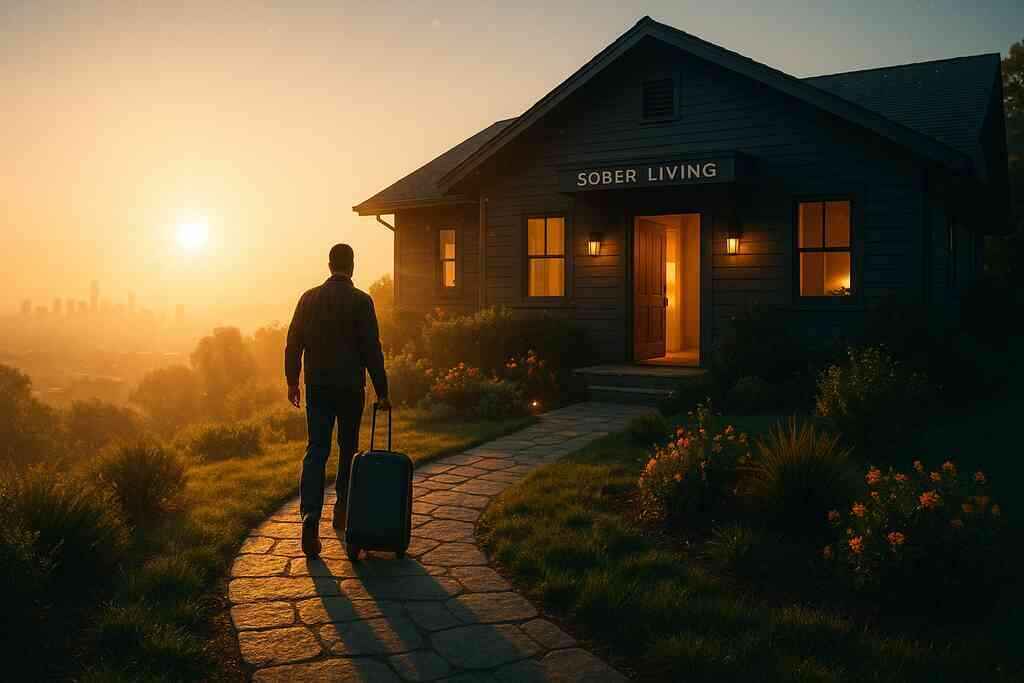
Ultimate Guide to Sober Environments in Georgia Now
August 7, 2025
Embarking on the Journey to Sobriety in Georgia
Understanding the Landscape of Sober Living in Georgia
Sober living in Georgia offers a rich tapestry of opportunities and environments for those seeking a life free from addiction. It’s essential to understand the plethora of sober environments around Georgia that foster healing and long-term recovery. From the bustling cityscapes of Atlanta to serene rural settings, each locale presents unique benefits for sobriety. Navigating through the different offerings becomes crucial as they include everything from quiet recovery retreats to dynamic urban sober houses. Each environment is designed to support residents in various stages of their recovery journey, providing tailored support aimed at long-term sobriety.
Top Sober House: Your Guide to Finding Supportive Environments
For those embarking on this transformative journey, Top Sober House stands as an indispensable guide. This platform not only simplifies the search for sober living options but also connects individuals with diverse resources tailored for addiction recovery pathways in Georgia. Whether you are seeking a sober house nestled within a Georgia suburb or a recovery community thriving in the heart of Atlanta, Top Sober House is your gateway to discovering the ideal supportive environment. With its easy-to-use directory, finding the nearest sober living homes becomes seamless, empowering individuals to make informed decisions as they step towards a substance-free future.
Navigating the Path to Recovery: A Comprehensive Overview
Within the state of Georgia, navigating the path to recovery necessitates a comprehensive understanding of different environments and recovery programs. The journey is not just about finding a sober home but aligning with the right strategy that complements your personal recovery goals. Georgia’s sober living options include various programs, from structured halfway houses to peer-supported group homes, each offering unique advantages. Understanding the landscape and accessing resources-like those outlined in a guide to sober communities in Georgia-is critical for those in early recovery. As individuals advance in their recovery journeys, embracing community support and expert guidance ensures their experiences are both empowering and transformative.
Integral Elements of Georgia’s Sober Living Options
From Halfway Houses to Peer Support: The Range of Sober Facilities
Georgia’s sober living landscape is as diverse as it is vital for fostering successful recovery journeys. The state offers a myriad of sober facilities, each designed to cater to different needs in recovery. Halfway houses, for instance, play a critical role in transitioning individuals from intensive rehabilitation in addiction to independent living. These homes provide structured environments where residents can gradually rebuild their lives. Alongside, group homes emphasize the strength of peer support dynamics in Georgia sobriety, offering residents the chance to forge meaningful connections with others on similar paths. These sober homes offer nurturing environments that unite sobriety goals with shared experiences, laying a foundation for continued growth and healing.
The Role of Structured Daily Routines in Recovery
Structured daily routines are pivotal in promoting stability and setting the pace for an orderly life in sober living environments. In Georgia, sober living homes often implement curated schedules that balance responsibilities with personal time, encouraging a holistic approach to life. Residents wake up to predictable routines involving household chores, rehabilitation programs, and education or employment pursuits. This framework not only helps to counteract the chaos of past substance use disorder but also empowers residents to manage their time and emotions effectively. Additionally, incorporating practices such as mindfulness or exercise amplifies resilience against triggers. The role of routines thus becomes indispensable in ensuring the maintenance of sobriety, fostering an environment disciplined yet supportive of personal progress.
Long-term Sobriety and the Georgia Recovery Community
Achieving long-term sobriety often requires a well-entrenched support system, and Georgia’s recovery community plays a vital part in this. From the suburbs to busy urban centers, Georgia facilitates a wide array of support options. Participation in support groups, such as Alcoholics Anonymous or other 12-step programs, proves crucial for continuous engagement in the recovery process. The support group mechanism is designed to offer both communal solidarity and accountability, which are key in sustaining sobriety. Furthermore, residents are encouraged to engage with community-driven initiatives that strengthen their networks and build resilience against relapse. As individuals navigate their long-term recovery paths, this community serves as both a haven and a guiding force, assisting in the pursuit of a stable, rewarding, and substance-free future.

Maximizing the Benefits of Sober Environments in Georgia
Harnessing the Power of 12-Step Meetings and Support Groups
To truly maximize the advantages of sober environments in Georgia, one must understand the significance of 12-step meetings and support groups. These meetings are foundational pillars in the recovery process, offering a consistent framework that facilitates long-term abstinence from alcohol and drugs. The beginnings of Alcoholics Anonymous illustrate the effectiveness of peer-led support, which remains a cornerstone for those striving for sobriety. Participants gain not only emotional support but also accountability from these groups, which play a pivotal role in sober living programs across Georgia. Engaging regularly with Alcoholics Anonymous meeting resources or similar platforms provides individuals with vital connections and shared experiences that reinforce their commitment to a substance-free lifestyle.
Sober Home Regulations and House Rules: Keeping a Safe Environment
Regulations and house rules are integral to maintaining a secure, respectful, and sober environment. Each sober living home must adhere to state and local sober living regulations, ensuring that all its residents can thrive in a nurturing setting. These regulations serve as guidelines for operations, mandating standards that encompass health, safety, and resident conduct. House rules often involve stipulations such as curfews, mandatory meeting attendance, and zero-tolerance policies for substance use. Such measures help create a sanctuary where residents feel safe and supported in their recovery journey, laying down the groundwork for sobriety. Consistent enforcement of these rules ensures that residents remain focused on personal growth and healing without external pressures or disturbances.
Interconnection of Treatment Programs and Recovery Paths
The relationship between various treatment programs and recovery paths is a critical component for success in Georgia’s sober environments. A harmonious interconnection between inpatient, outpatient, and community-based treatments allows a seamless transition for individuals at different recovery stages. Comprehensive programs such as the intensive outpatient center model are designed to address personal needs while maintaining flexibility. This holistic approach integrates therapy, counseling, and community involvement, which strengthens recovery resilience. By navigating through diverse treatment options and identifying the necessary support systems, residents can confidently traverse their addiction recovery pathways in Georgia. This interconnected approach fosters a sense of empowerment, as individuals are supported by tailored strategies that cater to their unique recovery requirements.
Pioneering Recovery Programs and Strategies in Georgia
Cutting-edge Approaches to Treatment and Support
Innovative strategies in addiction treatment are shaping the landscape of sober living in Georgia. Cutting-edge approaches now integrate digital technology and holistic care, offering dynamic solutions for those seeking recovery housing in Georgia. Virtual therapy sessions and mobile applications for sober tracking have become instrumental in providing accessible and continuous care. These advancements not only enhance engagement but also facilitate personalized recovery pathways. Moreover, experiential therapies like art and music therapy complement traditional methods, catering to diverse recovery needs. By embracing such groundbreaking techniques, Georgia’s sober environments are at the forefront of delivering effective and comprehensive addiction recovery support.
The Impact of Inpatient and Outpatient Programs on Substance-Free Living
Inpatient and outpatient programs play a crucial role in Georgia’s addiction recovery landscape, offering a spectrum of services tailored to individual needs. Inpatient treatment provides intensive, round-the-clock care in a controlled environment, crucial for those with severe addiction. It offers a safe place for detoxification and specialized therapy, fostering a focused pathway to recovery. Conversely, outpatient programs offer flexibility, allowing individuals to maintain daily routines while receiving treatment. These programs emphasize peer support and continuous therapy, bridging connections within the Georgia recovery community. Together, they establish a robust framework that supports individuals in their transition to long-term sobriety, crafting effective pathways to substance-free living that Georgia can count on.
Future Trends: Evolving Recovery Strategies for Alcohol and Drug Abuse
The landscape of addiction recovery in Georgia is continually evolving, driven by new research and technological innovation. Future trends indicate an increased focus on integrated care models that consider both addiction and co-occurring mental health disorders. Emphasizing a holistic approach, these models are set to incorporate nutritional guidance, physical wellness programs, and mental health support to enhance recovery outcomes. Additionally, telehealth services and remote monitoring are expected to advance further, providing greater accessibility to support systems and sober environments around Georgia. This evolution promises to augment the effectiveness of recovery strategies, ensuring that individuals are not only addressing substance use disorder but are also nurturing overall mental and physical well-being, paving the way for a brighter, drug-free horizon.

Charting Your Sober Future: Steps Towards a Drug-Free Horizon
Building a Supportive Network: Connection in Recovery
Building a supportive network is fundamental to achieving a sustainable, drug-free future. Establishing connections with those who understand and share your journey enhances resilience against relapse. Engaging in community activities and attending support groups aids in this process. Whether through formal meetings or informal gatherings, connecting with peers aids in developing a strong foundation for recovery. Utilizing resources like the Narcotics Anonymous meeting finder can be crucial in locating nearby gatherings that fit your schedule. This network not only offers emotional and moral support but also fosters accountability amongst group members, which is vital for long-term sobriety.
Transformative Peer Support in Sober Living Houses
In sober living houses, peer support emerges as a transformative force, vital for individuals aiming for a substance-free life. The camaraderie found within these residences creates an environment where each resident can draw strength and understanding from others navigating similar challenges. Peer support dynamics in Georgia sobriety are instrumental in encouraging open communication and trust, which form the backbone of successful recovery journeys. Through shared experiences and mutual encouragement, sober housing residents can bolster each other’s resolve, creating a collective momentum toward healing. This shared journey not only enriches individual lives but also contributes to a thriving recovery community within Georgia’s sober environments.
Embracing a Substance-Free Lifestyle and Its Challenges
Embracing a substance-free lifestyle presents both profound opportunities and challenges. Transitioning into this new way of living involves redefining routines, relationships, and personal goals. While the benefits of sobriety, such as improved mental clarity and health, are well-documented, the path requires vigilance and dedication. Challenges like confronting triggers and managing stress can arise, but with the support of a committed community and structured programs, these hurdles become manageable. Georgia’s supportive sober environments, along with the guidance from experts, facilitate individuals’ adaptations to sober living. By focusing on personal growth and community connection, individuals can navigate the complexities of recovery, paving the way for a fulfilling, drug-free future.
Frequently Asked Questions
Question: How does Top Sober House help individuals find the best sober living options in Georgia?
Answer: Top Sober House offers a comprehensive directory that simplifies the search for sober living options across Georgia. Our platform connects individuals with a wide range of recovery housing opportunities, tailored to meet various needs, from halfway houses to peer-supported group homes. By utilizing our easy-to-navigate tools, you can effortlessly locate your ideal sober environment, ensuring that you receive the addiction recovery support necessary for long-term sobriety.
Question: What roles do structured daily routines play in Georgia’s sober homes, according to the Ultimate Guide to Sober Environments in Georgia Now?
Answer: Structured daily routines are crucial in maintaining stability within Georgia’s sober living homes. These routines foster a disciplined yet supportive environment that counteracts the chaos of past substance use disorder. Residents participate in chore schedules, rehabilitation programs, and personal activities, promoting holistic growth and resilience against triggers. Adhering to structured routines helps residents manage their time effectively, contributing to the success of their recovery journey in Georgia.
Question: How does Top Sober House support individuals in engaging with Georgia’s recovery community?
Answer: Top Sober House provides resources that facilitate connections within the Georgia recovery community, an essential support system for achieving long-term sobriety. Through our directory, individuals can find meetings such as Alcoholics Anonymous or 12-step programs that build communal solidarity and accountability. These connections play a pivotal role in successful recovery by fostering a nurturing environment where residents can share experiences and gain emotional support from peers.
Question: What are the benefits of the diverse sober facilities available throughout Georgia?
Answer: Georgia’s sober facilities, ranging from halfway houses to group homes, offer diverse advantages tailored to individual recovery needs. Halfway houses provide structured environments for residents transitioning from intensive rehabilitation to independent living. Group homes emphasize peer support, allowing residents to build meaningful connections and shared experiences. Our directory at Top Sober House can help individuals find the perfect facility that suits their recovery journey, ensuring continued growth and healing in a safe and supportive environment.
Question: How can Top Sober House assist in navigating the path to recovery, as highlighted in the Ultimate Guide to Sober Environments in Georgia Now?
Answer: Top Sober House assists individuals by offering invaluable guidance through their recovery journey. Our platform not only provides access to various sober living options but also emphasizes aligning with recovery strategies that complement personal goals. By choosing Top Sober House, individuals gain access to tailored programs, structured environments, and community-driven initiatives that reinforce their commitment to a drug-free lifestyle in Georgia.


